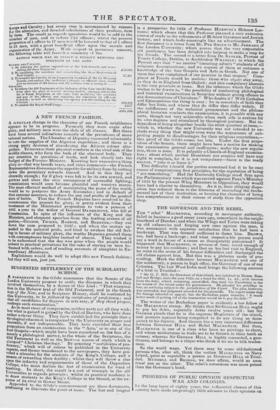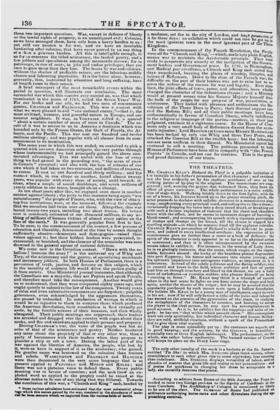PROGRESS OF PUBLIC OPINION RESPECTING WAR AND COLONIES. IN the
long lapse of eighty years, the influential classes of this country have made surprisingly little advance ill their opinions on these two important questions. War, except in defence of liberty or the lawful rights of property, is an unmitigated evil ; Colonies, as we have managed them, have only been a heavy burden to us : yet still our passion is for war, and we have an insatiable hankering after colonies, that have never proved to us any thing el:e thin a grievous burden. All this is intelligible enough, in so far bs concerns the titled aristocracy, the landed gentry, and a few jobbers and speculators among the mercantile classes ; for in patronage, in rise of rents, in jobs and undue privileges, they are sure to gain more than they lose. The losers by war and colonies, without the shadow of profitable return, are the laborious middle classes and labouring population. It is the latter alone, however, generally, that, instructed by education and long suffering, have at length come to their senses.
A brief retrospect of the most remarkable events within the period in question, will illustrate our conclusion. The most successful war which this country ever carried on, was that which terminated in the peace of 1763, called the Seven Years' War. For our leader and our ally, we had two men of consummate genius. CHATHAM and FREDERICK. This WAS a contest with what we were pleased to call "our national enemy,"—that is, the most civilized, humane, and powerful nation in Europe, and our nearest neighbour. It was, as VOLTAIRE called it, a quarrel "about a certain number of acres of snow in Canada." The re- sult of it was to secure to us in America a dominion which was bounded only by the Frozen Ocean, the Gulf of Florida, the At- lantic, and the Pacific. This war cost one hundred and twelve millions sterling ; and was popular with all classes from its com- mencement to its termination.
The same year in which this war ended, we contrived to pick a quarrel with ourown American subjects, the very parties through whose instrumentality we had principally gained the above enu- merated advantages. This war ended with the loss of every thing we had gained in the preceding war, "the acres of snow in Canada" excepted ; and also with the loss of colonies of our own which it had taken us two centuries, and millions of treasure, to create. It emit us one hundred and thirty millions ; and the contett which, in one shape or another, lusted almost twenty years, was popular with every class of society, until towards it close, when a couple of sound drubbings, and seven millions of ) early addition to our taxes, brought about a change. In ten short years after this, we engaged once more in another contest against liberty ; the party in this instance being again "our natural enemy" the people of France, who, with the view of obtain- ing free institutions, were, at the moment, following the example that we ourselves had twice over set them. Altogether, this war lasted twenty-two years, including two short truces. Its lowest cost is commonly estimated at one thousand millions, to say no- thing of millions of human victims of almost every nation on tke face of the earth.* It was generally popular from first to last. To be sure, in the commencement of the contest, a few persons of education and liberality, denounced at the time by names thought sufficiently abusive—democrats and demagogues—raised their voices against it ; but their boldest leaders were persecuted, in- carcerated, or banished, and the clamour of the remainder was soon drowned in the general uproar of national delirium.
We come now to the Canadian contest. "Down with the re- bellion! increase the army!" is the universal cry of Whig and Tory, of the aristocracy and the gentry, of speculating merchants and mercenary jobbers. In both Houses of Parliament, there is a perversion of truth, justice, and decency on this subject, which tn the morality of common life would drive the parties guilty of it from society. One Ministerial journal insinuates, that although the Canadians are a majority, they are Papists and speak French, and therefore must take the consequences. Another would give us to understand, that they were conquered eighty years ago, and ought quietly to submit to the law of the conquerors. Twenty years of calm and even submissive remonstrance are forgotten ; palpable grievances, even acknowledged by the aggressors themselves, are passed by unheeded. In satisfaction of wrongs to which it would be an injustice to them to compare those which produced the American Revolution, their constitution is first virtually set aside, by the forcible seizure of their treasure, and then wholly abrogated. Their public meetings are suppressed, their leaders are arrested and dragged over the country with ropes about their necks, and fire and sword are applied to their persons and property.
During CHATHAM'S war, the voice of the people was but an echo of that of the aristocracy and gentry. Neither hesitated any more about the propriety of that or any other war, than a party of buccaneers with their leaders when they propose to plunder a ship or rob a town. During the latter part oh' the war against the liberties of America, the people, who lost by it, were as keen in support of it as the aristocracy, who gained. No gentler name was bestowed on the colonists than traitors and rebels. WASHINGTON and FRANKLIN and HA.NCOCK were then denounced in the very same language that is at present applied to PAPINEAU and MORIN and ROLFE ; and there was not a plebeian voice to defend them. Every public meeting was in favour of coercion ; and the mob (now an ex- ploded word as applied to the people) could be raised at the shortest notice in fa our of any thing that was illiberal. Towards the conclusion of this war, a "Church and King" mob, headed by • Some curious calculators have estimated that the most substantial ideas. rags which this nation gained by the war, consisted in the abundance of mate- rial for boas matters whisk we imported from the various held. et battle.
a madman, set fire to the city of London, and kept ecisaession of it for three days: an elhibition which could not now be got up le the most ignorant town in the most ignorant part of the Three Kingdoms.
In the commencement of the French Revolution, the Pelee were all for "Church and King,"—which, made into plain English, means war to maintain the Aristocratic principle. They were ready to perpetrate any atrocity at the instigation of the Govern- ment leaders and Government press. In 1791, in Birmingham, now Radical par excellence, a Church and King mob rioted iota days unmolested, burning the places of Ivorship, libraries, and houses of Reformers. Down to the close of the French war, the difficulty on the part of their leaders was not to raise but to re. press the ardour of the masses for war and bigotry. Ever since then, the joint effects of taxes, peace, and education, have wheel changed the character of the industrious classes ; and a IVIinistry would at present sooner raise his Satanic Majesty himself than the bulk of the people for any purpose of war, persecution, or intolerance: They hailed with pleasure and enthusiasm the Re- volution of the Three Days in Paris; their discreet suppert car- ried the Reform Bill ; and all their public meetings have been enthusiastically in favour of Canadian liberty, wholly indifferent to the religion or language of the parties—matters, in their just judgment, extrinsic to a righteous cause. In the House of Com- mons only a very small body of Reformers dissent from the systee matic injustice; Lord BROUGHAM (once more HENRY BROUGH Am) has been backed by only one Whig and three Tory Peers, who attacked the Coercion Bill at the twelfth hour: but the labouring masses seem uniform in their dissent. No Ministerial agent has ventured to call a meeting. The petitions presented to both Houses of Parliament have been all in sympathy with ",the French Papists" in Canada, and not one for coercion. This is the grand and proud distinction of our times.



























 Previous page
Previous page